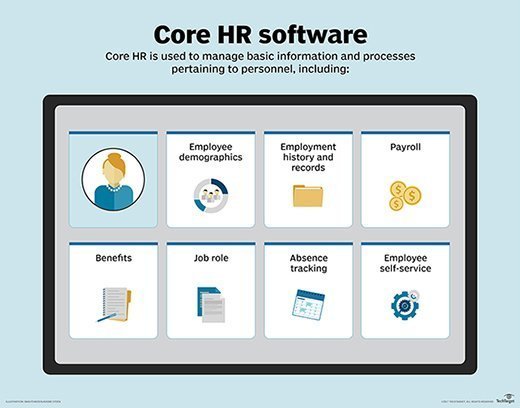core HR (core human resources)
What is core HR (core human resources)?
Core HR (core human resources) is an umbrella term that refers to the basic tasks and functions of an HR department as it manages the employee lifecycle. This includes the basic data captured about employees and the software used to manage basic HR processes, from recruitment to offboarding.
Core HR is an essential part of effective HR management and in developing an organization's employee experience. It provides the foundation that supports an organization's goals and objectives.
Having a streamlined core HR process provides an organization with advantages such as improved internal communication, insights gathered through data analytics, automated processes, centralized data storage and security.
Core HR functions of the human resources department
The HR department plays a vital role within an organization, providing core functions to the business, including the following:
- Employee recruitment and hiring.
- Collection and storage of employee data.
- Payroll.
- Benefits administration.
- Document signing.
- Internal relations.
- Employee training.
- Employee self-service (ESS) for tasks such as requesting time off or updating personal details.
- Compliance and safety.
Core HR is sometimes used to mean these basic HR responsibilities in human capital management (HCM).
What are core HR processes and how do you manage them?
Core HR processes encompass the whole employee journey, covering HR-related areas such as the following:
- Talent management. This includes finding the right candidates and conducting recruiting and onboarding processes.
- Benefits. This includes keeping track of employee benefits such as health insurance, dental and vision.
- Training and learning management. This includes initial employee training, ongoing employee training, upskilling and reskilling.
- Payroll. This includes paying and tracking employees' wages and salaries, withholding taxes or other deductions.
- Human resource planning. This includes identifying current and future human resources needs for an organization's overall strategic plan.
- Performance management. This includes monitoring employees' job performance, aligning employees with organizational goals and gathering employee feedback.
- Offboarding. This includes streamlining the employee offboarding experience, such as the deletion of employee data and conducting exit interviews.
Software and other HR technology are used to manage these HR processes. This simplifies the processes of storing, organizing, accessing, managing and deleting core HR information and data. It also makes these processes more efficient, with some HR technologies being able to automate data-driven or time-consuming tasks.
For example, HR technology vendors that specialize in payroll can incorporate functions for paying and tracking employees' wages and salaries. As another example, training-based software could include a learning management system tool that customizes training programs, tracks if employees have completed the training and assesses their performance. There are many HR software tools available to help manage the different tasks and responsibilities of an HR department.
What is core HR information or data?
In the HR data sense, core HR means the personnel information required to legally employ and administer to employees. This includes the following:
- Employee addresses.
- Birth dates.
- U.S. Social Security numbers or national identification numbers.
- Employment eligibility forms.
- Salary and payroll information.
- Compliance with organizational or government rules.
- Work hours and absence tracking.
- Benefits information.
Core HR data also includes information such as job descriptions, titles and organizational structures.
What is core HR software?
The term core HR has largely come to mean the core HR software and technology that an organization uses to manage basic information and processes pertaining to personnel -- in other words, to manage the core HR information. In this category, Oracle Human Capital Management, SAP SuccessFactors and Workday Human capital Management are just a few examples.
HR software tools are typically referred to as human resource management systems (HRMS), human resource information systems (HRIS) or HCM.
HRIS provides technology for storing employee data and automating core HR functions, while HRMS vendors add HCM features. HCM is also referred to as either a set of HR processes, or the name of the category of software.
Another way to explain this is that HRIS is the core administrative system, while HCM also covers employee-centric processes, and HRMS acts as the most generalized term. HRMS is commonly used synonymously with the less commonly used term, HRIS, however.
Core HR technology systems have long been marketed under the labels HRIS and HRMS, but HCM has begun to displace both terms in recent years.

What are the functions of core HR software?
Although functions vary from vendor to vendor and specific software, core HR platforms typically store basic information about an organization's employees in a centralized database. The database contains personally identifiable information, such as employee addresses, birth dates and Social Security numbers or national identification numbers, as well as other information about the employee, including the following:
- Job specifics, such as title and description.
- Payroll information, such as salary and tax withholding.
- Enrollment data for benefits, such as health, dental and vision.
- Sick days and vacation days.
- Documentation for mandatory training.
- Worker eligibility forms documenting the right to work in the country of employment.
Aside from storing employee data, other common core HR software functions center around features that are designed to support or automate core HR processes, including the following:
- Evaluating employee performance.
- Data visualization tools like dashboards.
- Offering ESS portals.
- HR document signing and storage.
- Tracking benefits.
- Payroll processing.
Core HR software self-service portal
An ESS is a platform that lets employees access, manage and make HR-related requests. The ESS portal is typically made available to employees as a secure web-based platform or mobile application provided by an organization's HR department. This lets employees perform tasks like managing their personal information, viewing their pay stubs, enrolling in benefits or requesting time off without needing help from their HR department. This also reduces the administrative workload of the HR department.
Many software applications that support core HR functions provide managers and employees with a self-service portal.
Integration with talent management, other systems
The concept of core HR functions is changing quickly due to major cultural shifts in employment and HR technology. Core HR software plays a major role in this series of changes, as it lets HR departments take on more strategic responsibilities by reducing time spent on administrative tasks.
Software that automates the processes of accessing, managing and tracking core HR records is often integrated with software for related HR processes. For example, the software can integrate core HR with other HR functions such as talent management, workforce planning and learning management.
Talent management systems, for example, support core talent management processes, such as recruitment, onboarding, performance management, training, payroll and professional development. Core HR software typically overlaps with the same areas. The information from core HR -- including job titles of employees, the number of employees and their salaries -- is also vital for effective HR management.
Core HR software covers many different areas that follow the employee journey. Learn about different HR software features and their requirements.







